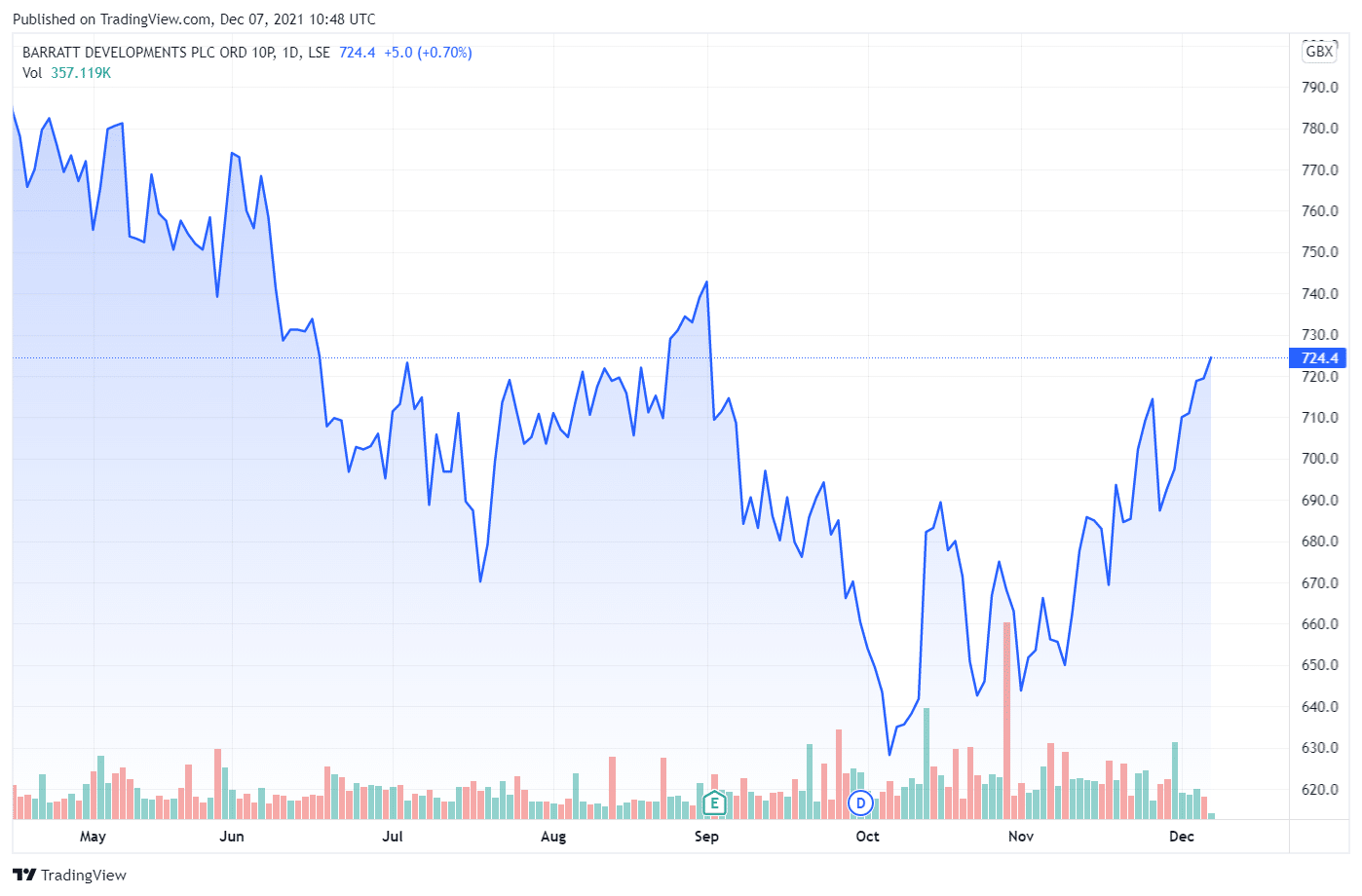Barratt Developments Share Price Forecast December 2021 – Time To Buy BDEV?
Please note that we are not authorised to provide any investment advice. The content on this page is for information purposes only.
Shares of one of the UK’s leading residential property development organisations Barratt Developments PLC (LSE: BDEV) are in the green today after closing at 719.4p on December 6th (17:51 GMT). Barratt Developments PLC is a property developer headquartered in the UK. Housing construction and Commercial Developments are two of the company’s sectors. BDEV is a small-cap share that has gotten considerable attention in recent times due to a significant price change on the London Share Exchange.
Barratt Developments – Technical Analysis
According to the financial statement from Barratt Developments, the market cap of the company is £734.624 billion with total assets worth £748.97 billion. Total revenue for 2021 was £481.17 billion, whereas it was £341.92 billion a year ago.

Technical indicators such as moving averages for BDEV including Exponential Moving Average (10)(709.1), Simple Moving Average (10)(708.6), Exponential Moving Average (20)(697.9), Simple Moving Average (20)(695.8) are pointing towards a buying action. Oscillators such as Relative Strength Index (14)(65.1), Stochastic %K (14, 3, 3)(87.5), Commodity Channel Index (20)(136.1), Average Directional Index (14)(21.3), on the other hand, are neutral.
68% of all retail investor accounts lose money when trading CFDs with this provider.
Recent Developments
The housing industry in the United Kingdom has reached a record high that was not observed since 2004. Shares are now trading at around 720p at the time of this writing, whereas the shares were selling for 529p at this point last year. At present prices, BDEV shares have a price-to-earnings ratio of a little over 10, which might be regarded as reasonable.
Barratt is among many UK property developer shares that have lately experienced decent performance. Barratt released an update for the period of July 1 to October 10 recently, which was quite interesting. The highlight of the announcement for me was that reservations remained “strong” despite the expiration of the Stamp Duty holiday. When net reservation rates are compared to pre-pandemic pricing, it is evident that they have increased by nearly 18% since the same time last year.
Barratt Developments combines a flourishing industry’s growth potential with a consistent 4.3 per cent dividend yield. The business wants to expand its already sizable inventory of plots and residences. The housing market had its busiest year since 2007 in terms of revenues in 2021. Barratt Developments, on the other hand, put its extra capital to great advantage. The firm described the clearance of 3,735 additional plots in the latest business update and intends to sanction between 18,000 and 20,000 plots in 2022. In FY22, the company aims to finish 17,000–17,250 residences.
This might have a positive impact on overall financial statements. However, rising personnel and raw material prices in construction are a significant influence as well. Inflation may impact prices, resulting in an overpriced finished product that may discourage potential investors.
Should You Buy Barratt Developments Shares?
The market appears to have fully priced in BDEV’s positive prospects, with shares trading at a premium to their fair market value. Selling high and buying back up when the price falls to its true worth might be advantageous if you feel BDEV should be trading below its present price. However, before you consider buying, verify to see if the fundamentals have altered. The positive outlook is good for BDEV, but it’s worth looking into other elements to see if there’s a way to profit from the next drop in prices.
Barratt Developments, however, is well-positioned to profit from the current protracted property boom, which is why I’m contemplating a stake in the FTSE 100 Company. In my opinion, Barratt, being one of the most prestigious house builders in the United Kingdom, might be an excellent asset to one’s portfolio.






